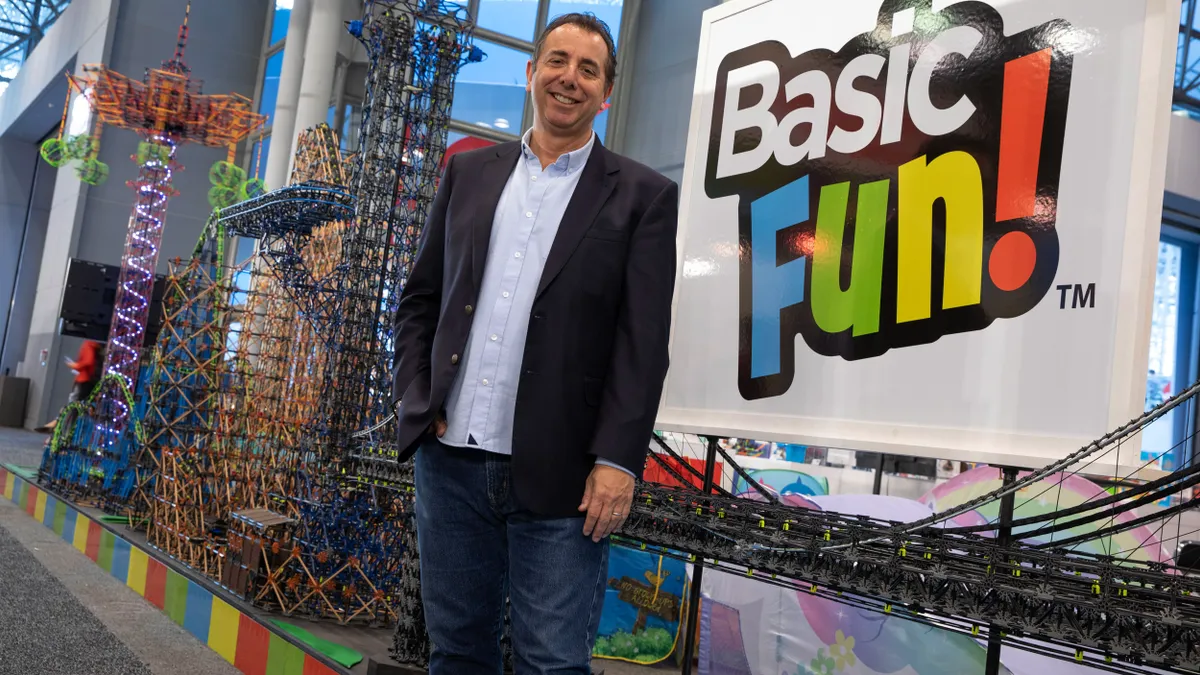Dive Brief:
-
Toy company Basic Fun on Friday filed for Chapter 11 in bankruptcy court in Delaware. The company sells its owned and licensed brand portfolio, which includes iconic toys by Lite Brite, Tonka, K’nex, Lincoln Logs and the Care Bears, to Walmart, Target, Amazon and amusement parks.
-
Basic Fun said the 2017 bankruptcy of Toys R Us, followed by the COVID-19 pandemic and supply chain issues affected the company’s business operations. In court documents, the company claimed liabilities and assets of $50 million to $100 million. It also reported owing $11.6 million to third party suppliers, vendors and other creditors.
- In a statement, Basic Fun said it plans to continue operations during restructuring and stay in business post-bankruptcy. The company is seeking court approval of $50 million of debtor-in-possession financing from Great Rock Capital and an additional financing from Royal Bank of Canada.
Dive Insight:
Established by Jay Foreman in 2009 as The Bridge Direct — a licensing and logistics company — Basic Fun said it built its business strategy on acquiring toy companies and products through mergers and acquisitions. Licensed products generate about 70% of the company’s revenue.
“Since the demise of our industry's largest toy retailer Toys R Us in 2018, through the tumult of the trade wars with China in 2019, Covid in 2020 through 2021, the travails of the supply chain crisis in 2022, inventory overstocks in 2023, and consumer slowdown in the early part of 2024, our industry and Basic Fun have been through a gauntlet of challenges,” Foreman said in a statement. “We intend to use the restructuring process to put those challenges in the rear-view mirror, enabling us to secure a successful future and position us for growth and value creation.”
If approved, Basic Fun said the financing will provide liquidity to continue business operations, including enabling the company to buy and sell inventory, and support its licensing, retail and vendor partners. The company’s founders, Foreman and John MacDonald, have also agreed to provide up to $5 million in loans. Basic Fun said it intends to pursue a restructuring plan that will allow it to emerge from bankruptcy as a going concern.
Basic Fun has faced a series of economic and business challenges in recent years. Weeks after its initial debt raise, the company’s largest customer, Toys R Us, filed for bankruptcy in 2017 and ultimately liquidated and went out of business (Brand management firm WHP Global has since acquired and revived the Toys R Us brand).
At that time, Toys R Us generated $35 million in annual sales for Basic Fun. But the bankruptcy left the company with $6 million in uncollectible receivables, Frank McMahon, the company’s chief financial officer, said in court documents. Ultimately, the company collected only $1 million through its insurance due to the Toys R Us bankruptcy.
Throughout 2019, the company said it struggled to transition its volume of inventory from the now-defunct Toys R Us to Amazon. Also in 2019, the company sought forbearance from defaults under 2017 credit agreements. Foreman and MacDonald loaned the company a total of $18 million between March and September of that year.
In 2020, the economic effects of the pandemic led the company to refinance its debt, resulting in pressure on the company’s liquidity. In 2021, Basic Fun said its amusement division experienced its worst year. With many entertainment venues and amusement parks closed due to the pandemic, that part of the company lost $10 million in sales. By late last month, the company had defaulted on some of its credit agreements and additional debts were due in early July.
Florida-based Basic Fun employs about 112 people in the U.S. and nearly 70 employees throughout Canada, the U.K. and Hong Kong. "With the financing we will obtain in the [court] process our vendors, licensors and customers should be assured in their ability to continue to confidently partner with us,” McMahon said.
















